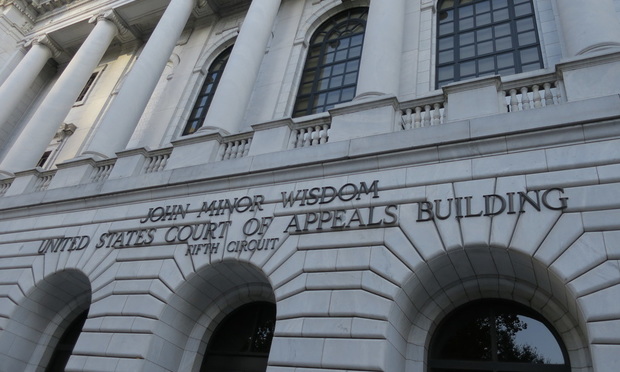 “It's safe to say that the ACA's defenders had a tough day in court,” wrote one expert, noting that judges seemed receptive to holding the act either wholly or partly unconstitutional. (Photo: Mike Scarcella/ALM)
“It's safe to say that the ACA's defenders had a tough day in court,” wrote one expert, noting that judges seemed receptive to holding the act either wholly or partly unconstitutional. (Photo: Mike Scarcella/ALM)Attorneys who observed oral arguments in the legal challenge to the Affordable Care Act all said they expect the U.S. Court of Appeals for the Fifth Circuit to remand the case to the trial court to redetermine if parts of the law might be saved.
“It's really hard to read the tea leaves of an argument of that length and complexity,” said Wright Close & Barger partner Raffi Melkonian of Houston, who attended the oral argument.
The oral argument Tuesday lasted an hour and 45 minutes as five attorneys representing all sides of the dispute over so-called Obamacare answered questions from Judges Carolyn Dineen King, Jennifer Walker Elrod and Kurt D. Engelhardt. King, the only judge appointed under a Democratic president, didn't ask any questions during the argument.
Related: What to expect as Obamacare oral arguments kick off
Nicholas Bagley, a University of Michigan School of Law professor who's a recognized expert on the Affordable Care Act, wrote in a blog post that the questioning was “brutal.”
“It's safe to say that the ACA's defenders had a tough day in court,” he wrote, noting that Elrod and Engelhardt seemed receptive to holding the act either wholly or partly unconstitutional.
In the dispute, two people and a group of Republican states, led by Texas, won a ruling in December 2018 that the act's mandate requiring people to purchase health insurance was unconstitutional, ever since Congress in 2017 zeroed out the tax penalty that uninsured people had to pay. U.S. District Judge Reed O'Connor also ruled that he couldn't sever the unconstitutional individual mandate from the rest of the law, which meant the entire Affordable Care Act was also unconstitutional. The court stayed the ruling pending appeal.
A group of 16 Democratic states and Washington, D.C., led by California Attorney General Xavier Becerra, had intervened early in the case to defend the law, and they appealed O'Connor's ruling. In May, the Department of Justice announced it agreed the whole law was unconstitutional, and wouldn't defend it on appeal. This prompted the U.S. House of Representatives to intervene to defend the law.
South Texas College of Law Houston professor Josh Blackman, who's written two books about the Affordable Care Act, said the judges' questions gave him the impression that the court was sympathetic to the plaintiffs' side.
“The most likely outcome here is the court affirms the lower court with respect to standing and the merits and they issue a remand to decide what specific portions can be salvaged from the law,” he said.
Melkonian, who represented three conservative law professors in filing an amicus brief in the case, said he was struck by a multitude of questions by Elrod about the proper remedy if the Fifth Circuit sent the case back to the trial court.
“There were many minutes of questions about: If we did remand, what would that look like? What would a remand be for? What would we do about severability,” explained Melkonian.
Bagley also noted the lengthy discussion about severability, but explained that judges seemed divided. Engelhardt expressed skepticism that the individual mandate could be severed, since case law has found the mandate was the base of a comprehensive scheme to regulate insurance markets. Elrod at times also seemed skeptical about taking a “blue pencil” to the legislation, wrote Bagley, but other times, she was critical of the idea of tossing the entire law.
At one point, Elrod asked the California coalition's attorney whether his clients would still face an injury if all the Fifth Circuit did was declare the individual mandate as unconstitutional. Several times Elrod asked attorneys how it's possible that provisions in the law that require restaurants to post calorie counts on their menus could also be unconstitutional.
“Toward the end, she raised the possibility of remanding the case to Judge O'Connor, perhaps with instructions for him to take another crack at severability,” Bagley wrote. “A remand for greater clarity on the scope of the judgment—to whom does it apply? can't some parts of the ACA be severed?—may be in the cards.”
Blackman said if the Fifth Circuit did remand the case to the trial court to save parts of the law, it could be a lengthy procedure. First, the court would have to redetermine if the individual mandate can be severed from the rest of the law, and next, comb through the entire act to determine which provisions to salvage.
© Touchpoint Markets, All Rights Reserved. Request academic re-use from www.copyright.com. All other uses, submit a request to [email protected]. For more inforrmation visit Asset & Logo Licensing.







